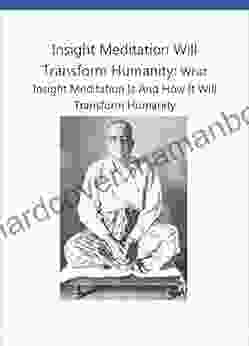Unlocking Inner Wisdom: A Comprehensive Guide to Insight Meditation (Vipassana)

In the tapestry of human history, meditation has emerged as a timeless thread, guiding individuals towards profound self-discovery and spiritual awakening. Among the myriad meditation practices, Insight Meditation, also known as Vipassana, stands out as an ancient and transformative technique that has captivated practitioners for centuries.
Originating in the heart of ancient India, Vipassana, meaning "to see things as they truly are," encompasses a rigorous and systematic approach to self-observation and contemplation. Through the practice of Vipassana, individuals embark on a profound journey of introspection, cultivating self-awareness, compassion, and ultimately liberation.
4.5 out of 5
| Language | : | English |
| File size | : | 1093 KB |
| Text-to-Speech | : | Enabled |
| Screen Reader | : | Supported |
| Enhanced typesetting | : | Enabled |
| Word Wise | : | Enabled |
| Print length | : | 4 pages |
| Lending | : | Enabled |
Historical Roots and Lineage
The origins of Vipassana can be traced back to the teachings of the Buddha, who in the 6th century BCE, rediscovered and popularized this ancient meditation practice. According to Buddhist tradition, the Buddha attained enlightenment under the Bodhi tree after years of spiritual seeking. It was during this transformative experience that he gained profound insights into the nature of reality, including the Four Noble Truths and the Eightfold Path.
The lineage of Vipassana has been passed down through generations of enlightened masters, who have preserved and refined the teachings over the centuries. Among these influential teachers were Mahasi Sayadaw, S.N. Goenka, and Pa-Auk Sayadaw, whose contributions have played a significant role in the revival and dissemination of Vipassana in modern times.
Principles and Techniques
At the core of Vipassana lies the fundamental principle of "anicca," meaning impermanence. Vipassana practitioners cultivate an unwavering awareness of the transitory nature of all phenomena, including thoughts, emotions, and physical sensations.
The primary technique employed in Vipassana is "anapanasati," or mindfulness of breathing. Practitioners focus their attention on the subtle sensations associated with the breath as it enters and exits the body. Through this sustained observation, they develop a heightened awareness of the present moment and the interconnectedness of all things.
As the practice deepens, practitioners progress to "vipassana" itself, where they observe the subtle vibrations and sensations within the body. They witness the arising and passing of these sensations without judgment or attachment, cultivating equanimity and insight.
Benefits of Vipassana
The practice of Vipassana offers a myriad of profound benefits, both on a personal and societal level. These benefits include:
- Increased Self-Awareness: Vipassana cultivates a deep understanding of one's own mind and emotions, promoting self-acceptance and compassion.
- Stress Reduction: By fostering mindfulness and equanimity, Vipassana helps individuals manage stress, anxiety, and emotional reactivity.
- Improved Concentration: The practice of mindfulness of breathing and body sensations enhances concentration and focus.
- Liberation from Suffering: Vipassana aims to uproot the root causes of suffering by cultivating detachment and wisdom.
- Social Harmony: By fostering compassion and understanding, Vipassana promotes harmonious relationships and peaceful coexistence.
Traditional Retreats and Modern Adaptations
Traditionally, Vipassana retreats are conducted in silence and follow a rigorous schedule. Participants typically spend 10-14 days in meditation, often isolated from external distractions. These intensive retreats provide a conducive environment for deep introspection and transformative experiences.
In recent times, Vipassana has been adapted to meet the needs of modern society. Shorter retreats and online courses have been developed to make the practice more accessible. However, it is important to note that the traditional retreat structure remains an essential part of the Vipassana tradition and is highly recommended for those seeking a profound transformative experience.
Vipassana, a timeless meditation practice rooted in ancient wisdom, empowers individuals to cultivate self-awareness, compassion, and liberation. Through the systematic observation of the breath and body sensations, practitioners gain profound insights into the nature of reality and their own interconnectedness.
Whether practiced in a traditional retreat or through modern adaptations, Vipassana offers a transformative path towards inner peace, well-being, and a life lived with greater mindfulness, compassion, and purpose.
4.5 out of 5
| Language | : | English |
| File size | : | 1093 KB |
| Text-to-Speech | : | Enabled |
| Screen Reader | : | Supported |
| Enhanced typesetting | : | Enabled |
| Word Wise | : | Enabled |
| Print length | : | 4 pages |
| Lending | : | Enabled |
Do you want to contribute by writing guest posts on this blog?
Please contact us and send us a resume of previous articles that you have written.
 Top Book
Top Book Novel
Novel Fiction
Fiction Nonfiction
Nonfiction Literature
Literature Paperback
Paperback Hardcover
Hardcover E-book
E-book Audiobook
Audiobook Bestseller
Bestseller Classic
Classic Mystery
Mystery Thriller
Thriller Romance
Romance Fantasy
Fantasy Science Fiction
Science Fiction Biography
Biography Memoir
Memoir Autobiography
Autobiography Poetry
Poetry Drama
Drama Historical Fiction
Historical Fiction Self-help
Self-help Young Adult
Young Adult Childrens Books
Childrens Books Graphic Novel
Graphic Novel Anthology
Anthology Series
Series Encyclopedia
Encyclopedia Reference
Reference Guidebook
Guidebook Textbook
Textbook Workbook
Workbook Journal
Journal Diary
Diary Manuscript
Manuscript Folio
Folio Pulp Fiction
Pulp Fiction Short Stories
Short Stories Fairy Tales
Fairy Tales Fables
Fables Mythology
Mythology Philosophy
Philosophy Religion
Religion Spirituality
Spirituality Essays
Essays Critique
Critique Commentary
Commentary Glossary
Glossary Bibliography
Bibliography Index
Index Table of Contents
Table of Contents Preface
Preface Introduction
Introduction Foreword
Foreword Afterword
Afterword Appendices
Appendices Annotations
Annotations Footnotes
Footnotes Epilogue
Epilogue Prologue
Prologue Ralph Manheim
Ralph Manheim Vita Ayala
Vita Ayala Drew Lindsay
Drew Lindsay Kevin J Wetmore
Kevin J Wetmore Jason Lucas
Jason Lucas Ram V
Ram V Joel Stern
Joel Stern Michel Ouellette
Michel Ouellette Richard Wehrman
Richard Wehrman Tamara Mellon
Tamara Mellon Monae Everett
Monae Everett Don Lamont
Don Lamont Nick Dang
Nick Dang C Scott Anderson
C Scott Anderson Jeff Thomas
Jeff Thomas Susan Kramer
Susan Kramer Harold Evensky
Harold Evensky Ed Back
Ed Back Emma Murray
Emma Murray Yolanda Washington Cowan
Yolanda Washington Cowan
Light bulbAdvertise smarter! Our strategic ad space ensures maximum exposure. Reserve your spot today!
 Raymond ChandlerFollow ·7k
Raymond ChandlerFollow ·7k Tyrone PowellFollow ·2.6k
Tyrone PowellFollow ·2.6k Trevor BellFollow ·11.9k
Trevor BellFollow ·11.9k Aldous HuxleyFollow ·6.9k
Aldous HuxleyFollow ·6.9k Oscar WildeFollow ·9.1k
Oscar WildeFollow ·9.1k Francisco CoxFollow ·7.4k
Francisco CoxFollow ·7.4k Paul ReedFollow ·2.2k
Paul ReedFollow ·2.2k Doug PriceFollow ·17k
Doug PriceFollow ·17k

 Eugene Powell
Eugene PowellComplete Guide to Using Yoga With Kids: Benefits, Tips,...
Yoga is an ancient practice that has been...

 Benji Powell
Benji PowellHow to Make $000 Per Week on Craigslist
Are you looking for a way to make extra money...

 Gabriel Garcia Marquez
Gabriel Garcia MarquezGrocery Row Gardening: The Exciting New Permaculture...
Kick-start your gardening journey with the...

 Hayden Mitchell
Hayden MitchellUnveiling the Gripping World of Winterwood: Ben Hood...
In the annals of crime thrillers, the...

 E.M. Forster
E.M. ForsterThe Financial Advisor Guide To Managing and Investing...
As a financial...

 Lee Simmons
Lee SimmonsIn My Shoes Memoir: A Poignant Journey of Resilience,...
In the tapestry of life, adversity often...
4.5 out of 5
| Language | : | English |
| File size | : | 1093 KB |
| Text-to-Speech | : | Enabled |
| Screen Reader | : | Supported |
| Enhanced typesetting | : | Enabled |
| Word Wise | : | Enabled |
| Print length | : | 4 pages |
| Lending | : | Enabled |











